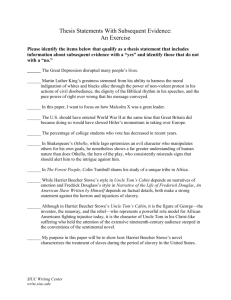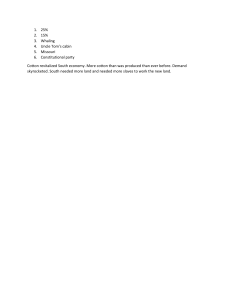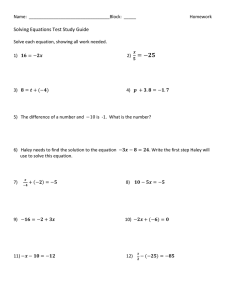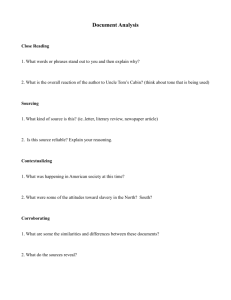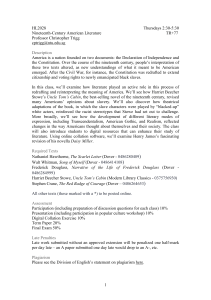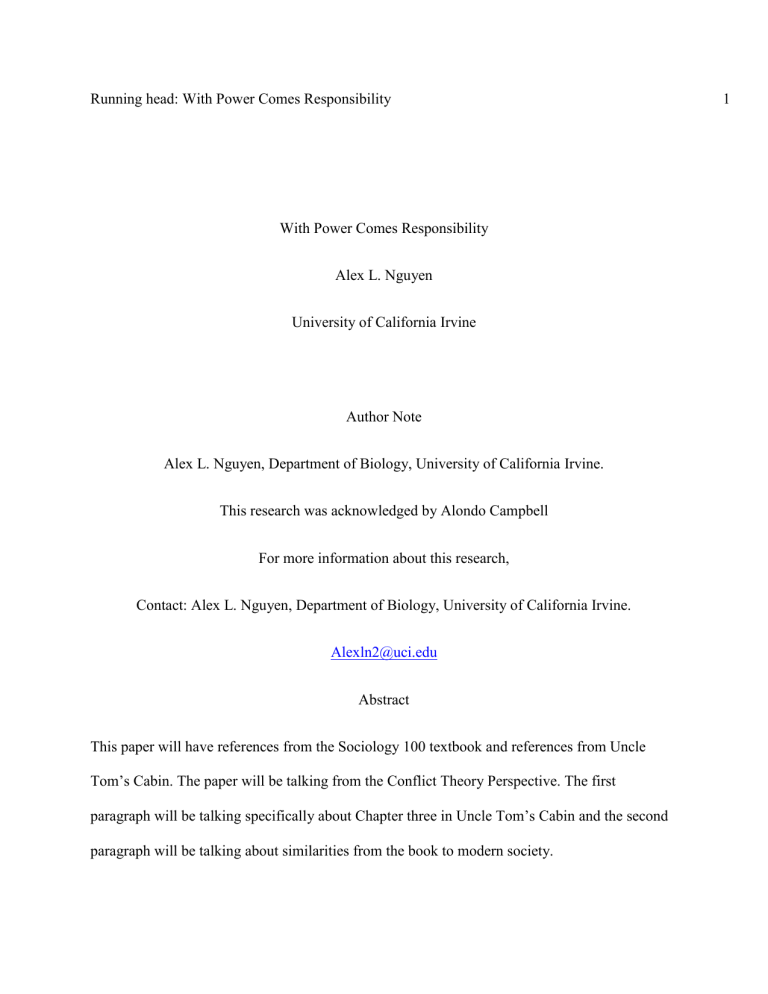
Running head: With Power Comes Responsibility With Power Comes Responsibility Alex L. Nguyen University of California Irvine Author Note Alex L. Nguyen, Department of Biology, University of California Irvine. This research was acknowledged by Alondo Campbell For more information about this research, Contact: Alex L. Nguyen, Department of Biology, University of California Irvine. Alexln2@uci.edu Abstract This paper will have references from the Sociology 100 textbook and references from Uncle Tom’s Cabin. The paper will be talking from the Conflict Theory Perspective. The first paragraph will be talking specifically about Chapter three in Uncle Tom’s Cabin and the second paragraph will be talking about similarities from the book to modern society. 1 WITH POWER COMES RESPONSIBILITY 2 With Power Comes Responsibility I will be reviewing Uncle Tom’s Cabin in the conflict theory perspective. “According to conflict theory, society is a struggle for dominance among social groups (OpenStax).” In Uncle Tom’s Cabin George is a slave owned by Mr. Haley. Mr. Haley is the dominant group and George being in the subordinate group, he gets discriminated. The difference in power and the theory of prejudice is greatly shown in this novel. The idea of prejudice is a physical action against one because of his race or status. "Yes, Eliza, it's all misery, misery, misery! My life is bitter as wormwood; the very life is burning out of me. I'm a poor, miserable, forlorn drudge; I shall only drag you down with me, that's all. What's the use of our trying to do anything, trying to know anything, trying to be anything? What's the use of living? I wish I was dead (Beecher)!" Culturally, most plantation owners have slaves in the 19th century. As the slave owner, he has power over his slaves and that power makes him think he is superior to them. Although George is better than Mr. Haley at what he does and manages he gets treated inferiorly. "… Who made him my master? That's what I think of -- what right has he to me? I'm a man as much as he is. I'm a better man than he is. I know more about business than he does; I am a better manager than he is; I can read better than he can; I can write a better hand, -- and I've learned it all myself and no thanks to him (Beecher)…” Mr. Haley, however, knows he has more power and decides to abuse him and bring George down to his level. “…every chance he can get to insult and torment me, he takes. I thought I could do my work well, and keep on quiet, and have some time to read and learn out of work hours; but the more he sees I can do, the more he loads on (Beecher).” George gets mistreated because of his skin color. Mr. Haley thinks that he is superior. He follows the way of white supremacy which is the idea that white people are superior to others. Another WITH POWER COMES RESPONSIBILITY 3 representation of power abuse is shown through the young master Tom slashing his whip at the feet of the horses startling them until George tells him not to and in response he whips George for telling him to stop (Beecher). The cruelty of human behavior when they have power is sickening. Mr. Haley and his son show the cruel aspect of people with power. They think they are superior to George and this lead up to the idea of them being able to do what they want to George. Although Mr. Haley own slaves and own a plantation, they cannot let George keep his only happiness on the plantation, his dog Carlo. They see him feeling happy when he is with Carlo and that makes them uncomfortable. They think they are the only ones that deserve to be happy and so Mr. Haley and his son told George to drown Carlo. Although he did not do it, they drown the dog that was given by his wife and then they flogged George for not drowning his own dog. He also tells George to remarry and find another wife (Beecher). Mr. Haley takes everything George has away from him in order to oppress him. By doing this, Mr. Haley feels superior. With all of the abuse, George decides to run away and works in order for one day to buy his wife and kid. Examples in modern society similar to Uncle Tom’s Cabin according to the conflict theory are women’s dependence, boss and worker interactions, and family control. “Engels, a German sociologist, studied family structure and gender roles suggested that the same ownerworker relationship seen in the labor force is also seen in the household, with women assuming the role of the proletariat. This is due to women’s dependence on men for the attainment of wages, which is even worse for women who are entirely dependent upon their spouses for economic support (OpenStax).” This is similar to Uncle Tom’s Cabin through the convention of WITH POWER COMES RESPONSIBILITY 4 dependence. The slave owner depends on the slaves to do their work and provide for them although society tells them how much to provide. Another example would be boss and worker interactions. The worker has to listen to their boss if they want to keep their job and if they do not listen nor does something wrong, they would get fired. The boss and worker interaction is similar to George because if George does not listen to his master, he will get flogged. Another example similar to Uncle Tom’s Cabin can be seen in the household of Asian families. In an Asian household, parents and elderly think they know everything. They will decide everything for their kids. They want to control them and if their kids don’t listen, they will yell and get frustrated and talk about their hardships. Then they will then take what privileges they have away. The controlling aspect of Asian household is shown in the book Uncle Tom’s Cabin where George is controlled by his Mr. Haley. WITH POWER COMES RESPONSIBILITY 5 Reference OpenStax College, Introduction to Sociology. OpenStax College. 21 June 2012. <http://cnx.org/content/col11407/latest/>. Beecher Stowe, Harriet (1852). Uncle Tom's Cabin; or, Life Among the Lowly I. Boston: John P. Jewitt. Retrieved 14 June 2012.
